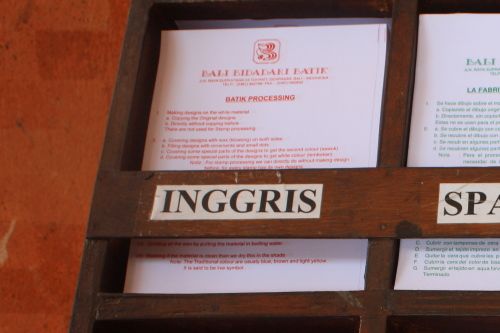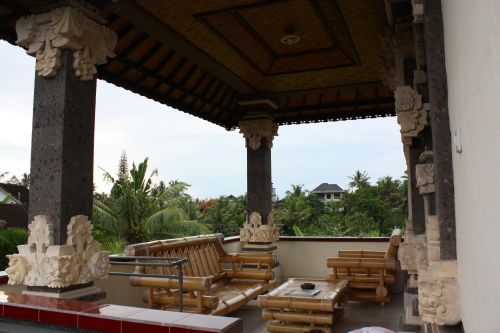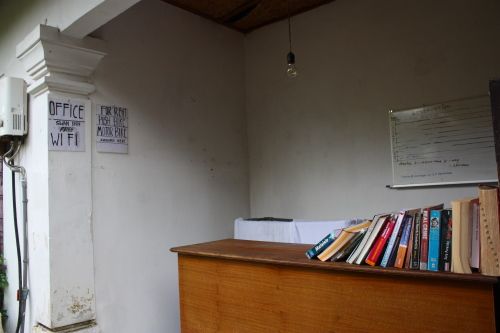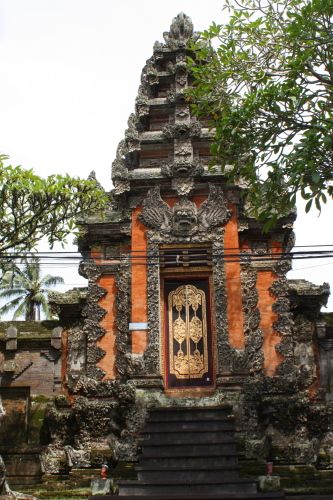Ubud, Bali

Jackamy
Paul & Derry Harper
Sun 31 Oct 2010 11:43
|
Sunday 31st October
When returning home from a meal
in Sanur the previous night the taxi driver offered his services as a driver and
we accepted. It is simple enough to hire a car but with the traffic and the
confusing roads it just isn't worth it when it is so cheap to hire a
driver/guide. Wayan picked us up at 9 o'clock on Sunday morning to begin our
tour up to Ubud, stopping at sights along the way.
You may have noticed that our
driver on Lombok was also called Wayan, this is because Wayan is the most
popular name in Indonesia. There are only four names that the majority of the
population give to their children, regardless of whether the baby is a boy or a
girl. The names are Wayan for the first child, Made the second, Nyoman the
third and Ketut the fourth and if you have a fifth child you start the
name cycle all over again. It is perfectly possible that a Wayan may marry
another Wayan and their first child would also be called Wayan. Thankfully most
people tend to adopt nicknames which reduces the confusion.
Our first stop was only a short
distance away and it was to see 'The Barong Dance'. Drama and dance in Indonesia
are intimately connected. The colourful Balinese performances, at times
supremely graceful, at others almost slapstick, are dances that tell stories,
sometimes from the Indian Ramayana or Mahabharata epics. Balinese dance is
performed both as entertainment and as a religious ritual, with an important
part in temple festivals.
The Barong represents an eternal
fight between a good and an evil spirit. Barong (a mythological
animal) represents a good spirit and Rangda (a mythological monster) represents
an evil one.
As interesting as it was to see
this Balinese dance I think once was enough!
  The orchestra..........A
servant

 Dewi Kunti..........Dewi Kunti
wants to sacrifice Sadewa
  The Rangda............A
servant
Next on the agenda was a batik
workshop where we found it most amusing that they call us Inggris!
 
 The girls applying the
wax...........Sewing clothes and cloths
Now we began to enter all the
arts and crafts villages, the first one, Batubulan. Stone carving is the main
craft of Batubulan, which means 'moon stone', and the temples around here are
noted for their fine sculptures. There were hundreds and hundreds of statues
beside the road for miles. Some were a bit naff but others, the
majority, were absolute works of art.

 We by-passed Celuk, which is
famous for it's gold and silver and went straight to Batuan which is noted as a
painting centre with scored of art galleries. Wayan picked a gallery for us to
peruse and it turned out that he chose well as we ended up buying a painting
which is now neatly rolled and stored on the boat ready to hang when we return
home.
 He even chose a superb spot for
us to eat lunch, Bebek Tepi Sawah, just outside of Ubud. The waitress showed us
to an outdoor pagoda requiring us to use stepping stones to cross and sit cross
legged around the low table, surrounded by palms and lotus flowers, it was
exquisite! We even overlooked a rice field, what a setting!

 
 Perched on the gentle slopes
leading up towards the central mountains, Ubud is supposed to be Bali's second
tourism centre but with a difference, the focus remains on Balinese culture.
They say it's not surprising that many people come to Ubud for a day or two and
end up staying longer, drawn in by the rich culture and many activities, and I
can see why, it has a really great atmosphere. Yes, there are lots of tourists,
but the narrow windy hillside streets have character and
culture to make up for it.
We'd chosen to stay at the lonely
planet guide top pick, however, when we arrived we decided it was too expensive.
So when a gentlemen who was sat on the street offered us a room, we thought
it wouldn't hurt to take a look. He lead us through alleyways, past chickens in
cages, until we arrived at 'The Swan Inn'. He has just 9 rooms, ours being the
penthouse! The decor was simple inside but outside was fabulous, our balcony
overlooked the many roofs of Ubud, we were right in the thick of it. And the
best part was the adjacent rice field, complete with an old lady who'd pull on a
string and instantly make the tin cans attached to bamboo shoots, which
were dotted all over the field, rattle, to scare away the birds. We even
witnessed the morning ritual/chant to the gods whilst eating our fruit platter
and eggs and bacon for breakfast on our balcony. All for $30! (Oh and plus the
free wi-fi)!

 Our room overlooking the
pond................Penthouse number 9
 The balcony

 Noisy but delightful
neighbour
  Ubud
rooftops..................The Swan Inn Office
Me and Amy left Paul lounging in
bed so that we could fit some shopping in before he started moaning about
trailing around the shops. Whilst walking down the alleyway we could hear
children singing and realised we must be next to a school. When we turned the
corner we found a group of around 15 boys practicing a dance routine, we
presumed it was their exercise class. The most adorable part were the infants
mimicking them and getting most of the steps wrong. It put a smile on our faces
anyway!

 
 After our retail therapy we
visited the temples and palaces that Ubud had to offer. First of all Ubud
Palace, a compound that has many ornate corners and was mostly built after the
1917 earthquake. The local royal family still lives there and you can wander
around most of the compound exploring the traditional buildings. These two huge
gates are two of the finest you'll find, the left one belongs to the palace and
the right is for the private temple for Ubud's royal family.

 Further along the street is the
very picturesque Pura Taman Saraswati. Waters from the temple at the rear of the
site feed the pond at the front, which is a riotous tangle of pink lotus
blossoms. There are carvings that honour Dewi Saraswati, the goddess of wisdom
and the arts, who has clearly given her blessing to Ubud.

 Although we only managed to visit
a small percentage of Ubud as the place is huge, you'd need days to check out
all the galleries and shops, we headed home the next day, via a village called
'Mas'. Although mas means 'gold', woodcarving, particularly mask carving, is the
craft practiced here. The road through Mas is lined with craft shops and there
are plenty of smaller carving operations in the back lanes. Historically,
carving was limited to temple decorations, dance masks and musical instruments,
but in the 1930's carvers began to depict people and animals in a naturalistic
way. It was fascinating watching the men work creating masterpieces and
contemporary furniture that you'd pay hundreds of pounds for at home but only
pennies here. We now know where all the nice furniture you see in the shops back
home comes from.

 |